#general:challenge
Explore tagged Tumblr posts
Text
youtube
I'm trying to get back into the swing of studying Basque a bit more, so I'm going to try to listen to a song every day and look up all the words I don't know. I'm starting off with this song from Idoia's newest album, De amar y desandar, which is called "Autofikzioa" and which I'm a big fan of.
ilunpetan - in the dark (from ilunpe - 'darkness')
ito - to drown
kontraesan - contradiction
errai - gut
gatibu - captive, prisoner
hala ere - despite everything, nonetheless
(Ez nago ziur zer den "urperatzear" - uste dut "urpe" eta "atze" elkartzen dituela baina ez dakit zer esaten nahi duen)
#hitz asko ulertu dut :0 ez dut hori espero baina suposatzen dut hitz batzuk dakizkidala#baina oso zaila da abestia ulertzea :') hau praktika egin behar dut#not sure if this will be the final format but i wanted to do something today otherwise i'd never start#the song is really good you should listen to it!!!!! even if you don't speak basque it's just a bop#and the lyrics are also great obv#gaurko abestia#<- daily song tag#2024 udako euskara#<- hau ez da zuzena baina etiketa udako erronka (?)#general:music#general:vocab#basque:general#basque:music#basque:vocab#general:challenge#basque:challenge
8 notes
·
View notes
Text
youtube
Gaurko abestia: "Zapalduen olerkia" - Ken Zazpi
Erronka hau pixka bat aldatu nahi dut: egunero, abesti bat aukeratuko dut eta hitzak idazten saiatuko naiz. Gero, hemen ez dudan ezagutu hitzak ipiniko ditut. Eta euskaraz idatziko dut, oso gaizki baina egin ahal dut, ba egingo dut!
Gaur egun Ken Zazpi-ren "Zapalduen olerkia" aukeratu dut, oso abesti polita da eta asko gustatzen zait. Bertsio hau Euskadiko Orkestra Sinfonikoa-rekin eta nire gustokoena da, baina jatorrizkoa ere atsegin dut.
Hiztegia berria:
ezintasun - inability, incapacity
zapaldu - to oppress
estali - to cover
samin - sorrow, grief (also adj. bitter)
bizigabe - lifeless
istripu - accident
Eta galdera pare bat: (1) "hurbilao" eta "hurbil" berdina da edo zer da desberdintasuna? (2) zer esan nahi du "estalita dute"? (ezin dut ulertu zein denbora den)
#i'm not sure if i explained very well but the question was what tense is estalita dute in bc i've never seen that before#the words i translated are making this look like a litany of woes it's actually a litany against woes it's hopeful i promise#maite dut abesti hau <333 oso polita da#basque:general#general:music#basque:music#general:challenge#basque:challenge#general:vocab#basque:vocab#gaurko abestia#2024 udako euskara
5 notes
·
View notes
Photo
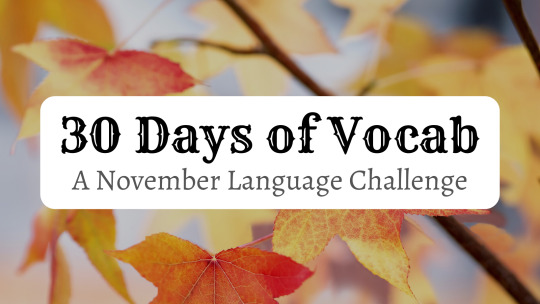
30 Days of Vocab - A November Language Challenge!
I know I’ve been a bit MIA on this blog for the past uhh *checks notes* let’s just say several months, but I’m back, and I want to get into studying languages more regularly again. That’s why I’ve created a vocabulary challenge for November, which you all are welcome to join!
This challenge is intended to expand vocabulary in areas which are of personal interest but might not get covered in class/textbooks. Basically, it’s a way to learn the words to talk about the things that you like to talk about, and it’s scalable to your level.
The challenge is very simple. For every day in November, pick a topic that interests you, and write up a list of vocabulary related to that topic. You can use all kinds of sources to find the vocabulary, and I’d encourage you to look into ways of interacting with the topic in your target language if you’re more advanced (books, podcasts, blogs, TV shows, etc)—if you find anything good, then share that too! And that’s the challenge, it’s that simple.
If you need something to keep you on track or to give you a bit more detail, I’ve made a workbook and a set of spreadsheets for guiding people through the whole process, which you can make a copy of right here (you'll have to open each one and go to File > Make a Copy). Don’t feel obliged to use it, though. And that’s basically it, hope to see you all on November 1st!
#does this make sense i hope it makes sense#i made the workbook and then i was like maybe this is insane and will scare people so i kind of pulled back on it#but yeah i'm somewhat back i guess#i'm in a more normal state of mind i have readjusted to the world and am no longer a feral hermit#i will try to post things! had many thoughts but then was busy being insane about other things#i've been wanting to do this for a while though so hopefully it works okay#general:challenge#30 days of vocab november#<- tag i will be using feel free to use it if you want to do this and make posts
33 notes
·
View notes
Photo
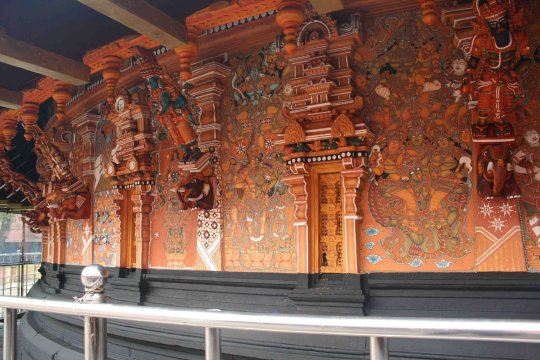
Image credit: Vaikom Temple Sreekovil Murals, Sivavkm on Wikimedia
For the tl90days challenge this week, I’m learning about Kerala mural paintings, which are a form of frescoes painted on the walls of South Indian (primarily Kerala) temples depicting scenes from Hindu mythology. Here is some vocabulary related to them, please let me know if you catch mistakes!
കേരളത്തിലെ ചുമർ ചിത്രങ്ങൾ /kēraḷattile cumar citraṅṅaḷ/ - Kerala mural painting
കരിങ്കല്ല് /kariṅkallŭ/ - granite
ചെങ്കല്ല് /ceṅkallŭ/ - laterite
നിർമ്മാണം /nirmmāṇam/ - construction
നിറക്കൂട്ട് /niṛakkūṭṭŭ/ - coloring
ചുവപ്പ് /cuvappŭ/ - red
മഞ്ഞ /mañña/ - yellow
നീല /nīla/ - blue
പച്ച /pacca/ - green
കറുപ്പ് /karuppŭ/ - black
വെള്ള /veḷḷa/ - white
ഹിന്ദുമതം /hindumatam/ - Hinduism
ക്ഷേത്രം /kṣētram/ - temple
കൊട്ടാരം /koṭṭāram/ - palace
#tl90days#this is not a very good list but i was pressed for time#anyways please correct because i didn't super check these!#malayalam#vocab lists#language month#(?)#malayalam:general#malayalam:culture#malayalam:vocab#malayalam:challenge#malayalam:reference#general:culture#general:vocab#general:reference#general:challenge
21 notes
·
View notes
Text
WOTDs in Malayalam
I’m cramming a week worth of Words of the Day into one post for Week 4 of the Target Language 90 Days Challenge. Theese were all words that my dad sent to me when we were doing a WOTD thing, plus the sentences I wrote with them and his corrections, so they should be reasonably correct?? Although he also can’t spell super well so??? Let me know if you see any mistakes.
തണുപ്പ് /taṇuppŭ/ - cold (n.)
അച്ചന് തണുപ്പ് ഉണ്ടൊ? /accanŭ taṇuppŭ uṇṭo/ - Does father have a cold?
ഒന്ന് /onnŭ/ - please*
ഒന്ന് ഇവിടെ വരു /onnŭ iviṭe varu/ - Please come here (polite/formal)
സുഖം /sukham/ - health
എനിക്ക് സുഖം ഇല്ല /enikkŭ sukham illa/ - I am sick (lit. I do not have health)
ഉപ്പ് /uppŭ/ - salt
ഉപ്പ് എനിക്ക് ഇഷ്ടമാണ് /uppŭ enikkŭ iṣṭamāṇŭ/ - I like salt
ഉടനെ /uṭane/ - immediately, at once
ഞാൻ ഉടനെ പറയഞ്ഞില്ല /ñān uṭane paṛayaññilla/ - I did not say it immediately
കുട്ടി /kuṭṭi/ - child (n.), small (adj.)
എന്റെ പൂച്ച കുട്ടിയല്ല /enṛe pūcca kuṭṭiyalla/ - My cat is not small
ഉന്തുക /untuka/ - to push**
അമ്മേ മാലതി എന്നേ ഉന്തി! /ammē mālati ennē unti/ - Mom, Malathi pushed me!
* - also means one, as in the numeral
** - I think this might be my family’s dialect, if other people don’t recognize it that’s probably why, also the sentence may not be spelled 100% correctly
#tl90days#these are very much in a context which none of you have and also half of them make no sense because i was just trying to write#but yes here you go#also i can probably spell better in malayalam than my dad#as in i learned a lot of these in conjunction with the written malayalam so i know how to spell them#and he just sort of sounds it out i think#like he's not illiterate in malayalam but he's not literate either??#that's contradictory but he falls somewhere on that boundary#and i'm not quite good enough at words to correct some of these#so let me know if you see corrections#language month#vocab lists#malayalam#malayalam:general#malayalam:vocab#malayalam:challenge#general:vocab#general:challenge
19 notes
·
View notes
Photo
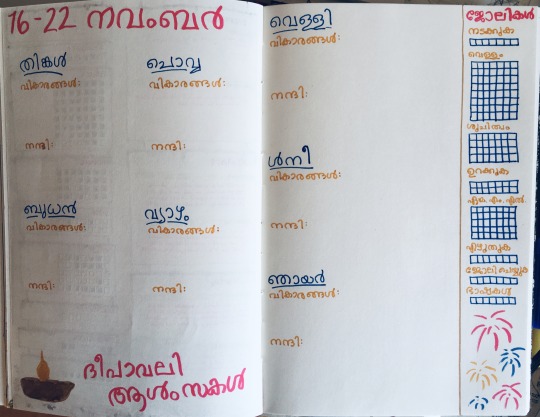
I made my bujo this week in Malayalam for the TL90Days challenge! (yes I do make a bullet journal no I never post it on here because what goes on there is between me and God alone) Since last week was Diwali, I thought I’d make that my theme (I usually do it based on a song but I don’t listen to any music in Malayalam 😅), please appreciate my diya and fireworks. Here are the words that I learned for this:
Days/Months:
നവംബർ /navambar/ - November
തിക്ങൾ /tikṅaḷ/ - Monday
ചൊവ്വ /covva/ - Tuesday
ബുധൻ /budhan/ - Wednesday
വ്യാഴം /vyāḻam/ - Thursday
വെള്ളി /veḷḷi/ - Friday
ശനി /śani/ - Saturday
ഞായർ /ñāyar/ - Sunday
Other:
വികാരങ്ങൾ /vikaraṅṅaḷ/ - feelings
നന്ദി /nandi/ - thanks, gratitude
ജോലികൾ /jōlikaḷ/ - jobs, tasks
നടക്കുക /naṭakkuka/ - to walk
വെള്ളം /veḷḷam/ - water
ശുചിത്വം /śucitvam/ - hygiene
ഉറക്കുക /uṛakkuka/ - to sleep
എഴുതുക /eḻutuka/ - to write
ജോലി ചെയ്യുക /jōli ceyyuka/ - to work
ഭാഷകൾ /bhāṣakaḷ/ - languages
ദീപാവലി ആശംസകൾ /dīpāvali āśamsakaḷ/ - Diwali greetings
A lot of these words I was very unsure about, so let me know if you see any mistakes/corrections!
#tl90days#my bujo is not comprehensible it is a convoluted system of to-do lists that i can check off#just to give me enough seratonin to not self-destruct#only i know what's going on here and that's how i like it#also my family doesn't celebrate diwali at all but i hope any followers who i have who celebrate it had a happy diwali!#my dad literally forgot it was diwali on saturday lol#is this a malayalee thing? i feel like no one in my family really celebrates it that much#also found out the one diwali party i was convinced i had been to was apparently my cousin's engagement#if people want me to post more bujo pictures i'll do it but i usually don't because they usually have mistakes#or are in catanglès because i try to do it in catalan and then forget halfway through#or i write thursday twice or something#language month#vocab lists#malayalam#malayalam:general#malayalam:vocab#malayalam:challenge#malayalam:practice#general:vocab#general:challenge#general:practice
17 notes
·
View notes
Text
Hobbies Vocab in Malayalam
This is part two of Week 2 for @langblrgang’s Year End Challenge! The assignment was to look up some vocabulary related to my hobbies, so I made a list of things I vaguely like to do and then made my dad translate them all. Unfortunately I have no idea how to spell anything in Malayalam and some of these weren’t in the dictionary, so the spellings may be a bit strange in places. Also it’s quite likely that some of these are informal or dialectal, so if any look weird to native speakers that might be why. Either way, let me know if you spot typos/mistakes/anything else!
കൃഷി /kr̥ṣi/ - farming
കൃഷി ചെയ്യുക /kr̥ṣi ceyyuka/ - to farm
കൃഷിക്കാരന് /kr̥ṣikkāran/ - farmer
തോട്ടം /tōṭṭam/ - garden
തോട്ടക്കാരന് /tōṭṭakkāran/ - gardener
ചെടി /ceṭi/ - plant
പൂവ് /pūvŭ/ - flower
വളക്കുക /vaḷakkuka/ - to grow
വരയ്ക്കുക /varaykkuka/ - to draw
എഴുതുക /eḻutuka/ - to write
കഥ /katha/ - story
വായിക്കുക /vāyikkuka/ - to read
പുസ്തകം /pustakam/ - book
നടക്കം പോവുക /naṭakkam pōvuka/ - to go for a walk
സൈക്കിള് ഓടിക്കുക /saikkiḷ ōṭikkuka/ - to ride a bicycle
നീന്തുക /nīntuka/ - to swim
പഠിക്കുക /paṭhikkuka/ - to study
ഭാഷ /bhaṣa/ - language
കേള്ക്കുക, കേൾത് ഇരിക്കുക /kēḷkkuka, kēltŭ irikkuka/ - to listen to, lit. to hear and to sit hearing (second one is from my dad and idk how to spell it)
പാടുക /pāṭuka/ - to sing
പാട്ട്, സംഗീതം (formal) /pāṭṭŭ, sangītam/ - music (first one is lit. song)
കാണുക, കാണ്ടെ ഇരിക്കുക /kāṇuka, kāṇṭe irikkuka/ - to watch, lit. to see and to sit seeing (see note above about “to listen”)
കളിക്കുക /kaḷikkuka/ - to play
ഫുട്ബോള് /fuṭbōḷ/ - football, soccer
ക്രിക്കറ്റ് /krikkaṛṛ/ - cricket
ഉണ്ടാക്കുക /uṇḍākkuka/ - to make
#edited version please reblog this one!!#tl90days#i have such terrible listening comprehension in malayalam#and also no ability to connect sounds people make to sounds i produce#i need to see things spelled out to know how to pronounce them but i also have lots of trouble distinguishing the spoken sounds#so it's a struggle#also i have no idea what i do with my life so this is an interesting list#and some of the words i wanted to learn he couldn't translate so *shrug*#vocab lists#malayalam#malayalam:general#malayalam:challenge#malayalam:reference#general:vocab#general:reference#general:challenge#malayalam:vocab
16 notes
·
View notes
Photo
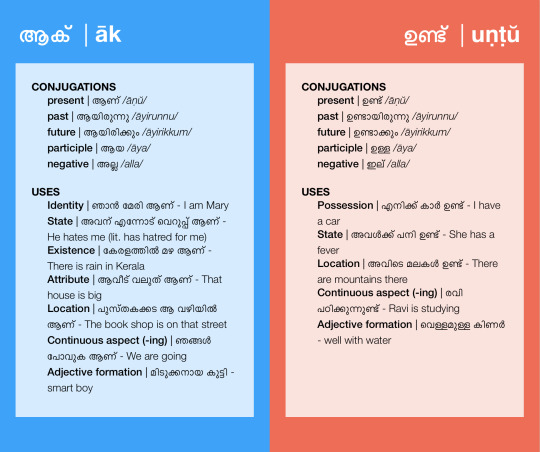
For my grammar review for week 3 of the Langblr Gang End of Year Challenge, I tried reviewing the difference between the two Malayalam verbs for “to be”, ആക് and ഉണ്ട്. There isn’t a lot of difference between them, as far as I can tell the main difference is similar to that in Romance languages, with ആക് being for a general truth or habitual state, while ഉണ്ട് is more temporary. However, the difference seems a lot less marked than that. Here’s an expanded version of what’s in the graphic above:
ആക് | āk
CONJUGATIONS
present | ആണ് /āṇŭ/
past | ആയിരുന്നു /āyirunnu/
future | ആയിരിക്കും /āyirikkum/
participle | ആയ /āya/
negative | അല്ല /alla/
USES
Identity | to say something is something | ഞാൻ മേരി ആണ് - I am Mary
State | to describe the emotional, mental, or physical state of someone or something | അവന് എന്നോട് വെറുപ്പ് ആണ് - He hates me (lit. has hatred for me)
Existence | to say that something exists | കേരളത്തിൽ മഴ ആണ് - There is rain in Kerala
Attribute | to describe the qualities of something | ആവീട് വലുത് ആണ് - That house is big
Location | to describe where something is | പുസ്തകക്കട ആ വഴിയിൽ ആണ് - The book shop is on that street
Continuous aspect (-ing) | with the infinitive ending in -ka, this works like -ing in English | ഞങ്ങൾ പോവുക ആണ് - We are going
Adjective formation | with the participle, to turn a noun or Sanskrit-derived word into an adjective (x being y) | മിടുക്കനായ കുട്ടി - smart boy
ഉണ്ട് | uṇṭŭ
CONJUGATIONS
present | ഉണ്ട് /āṇŭ/
past | ഉണ്ടായിരുന്നു /āyirunnu/
future | ഉണ്ടാക്കും /āyirikkum/
participle | ഉള്ള /āya/
negative | ഇല് /alla/
USES
Possession | with the possessor in the dative case, to say someone has something | എനിക്ക് കാര് ഉണ്ട് - I have a car
State | to describe the emotional, mental, or physical state of someone or something | അവൾക്ക് പനി ഉണ്ട് - She has a fever
Location | to describe where something is | അവിടെ മലകൾ ഉണ്ട് - There are mountains there
Continuous aspect (-ing) | with the present tense ending in -unnu, this works like -ing in English | രവി പഠിക്കുന്നുണ്ട് - Ravi is studying
Adjective formation | with the participle, to turn a noun into a possessive adjective (x having y) or an adverb into an adjective | വെള്ളമുള്ള കിണര് - well with water
I hope that helps, let me know if there are typos or mistakes! I am still not 100% clear on this either, so if you’re confused that’s probably on me :’)
#tl90days#don't understand this but whatever#i took this from a grammar#grammar are helpful reference materials but not good for self-teaching#maybe i'll see examples irl though and i can start to connect the dots#malayalam#resources#malayalam:general#malayalam:grammar#malayalam:reference#malayalam:challenge#general:grammar#general:reference#general:challenge
10 notes
·
View notes
Photo
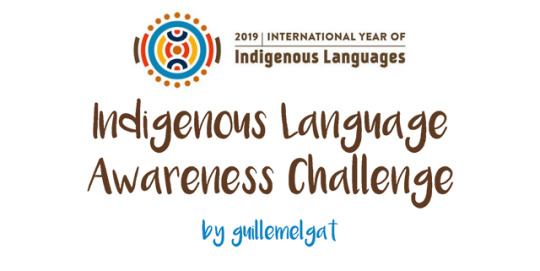
As the International Year of Indigenous Languages comes to a close, I thought that there has been a distinct lack of discussion about indigenous languages within the langblr community. Inspired by some of the linguistic diversity challenges which people were doing earlier in the year, I wanted to create a challenge focused on indigenous languages. This challenge is intended to take place between the weeks of October 14 and November 28, two dates which in the United States often glorify the genocide of indigenous peoples, as a way to support indigenous resistance and celebrate indigenous peoples through a difficult time of year. While other challenges have had a more linguistics-y bent, this one is intended to be more culturally- and socially-oriented, so if you’re not a linguist or have no linguistics background, don’t worry. (And if you *are* a linguist, feel free to add in more linguistic information, but make sure you keep it accessible to non-linguists.)
Languages:
Pick between 1-7 indigenous languages from the region you either live in or are from (try to avoid picking languages from the other side of the world or in places you have no connection to - this is meant to make you think about languages closer to home) and write about one language per week (or if you just want to do one language, you can do one part of the requirements/optional extras per week)
Requirements:
Name of the language in English and in the language itself (you can also put what it’s called in the national language if it’s not spoken in an anglophone country)
Basic information - historical and modern areas where it’s spoken, number of speakers, status (endangered? healthy?), linguistic family, cultural groups who speak it
Modern history - How much has the language been preserved? What things have happened to its speakers in the last century? Do the nations which speak it have any recognition? Important cultural/historical figures
Linguistic revitalization - Is there a revitalization project / are there plans to revitalize the language? Who is leading the revitalization efforts? How much (administrative/etc) support is there for it? Is there interest in learning the language?
Support - At least 1 project related to the language that people can donate to (as a form of mutual aid/reparations)
These points are intended to help people understand the recent context of the language, highlight and celebrate the people who are bringing it back, and give people a way to directly support revitalization. If you can’t find things for some of these points, that’s okay! The most important thing is not to treat indigenous languages as relics from the past or as slowly dying, but rather modern languages with modern speakers who are fighting hard not to be silenced.
Optional additional topics:
some basic linguistic information on the language (phonetics, phonology, morphology, syntax, etc.)
some basic cultural information - non-closed, baseline cultural things which outsiders should know/be respectful of
If you are an indigenous person, please feel free to add whatever extra information you want! And if you’re not indigenous, be sure to keep the discussion of these languages as respectful as possible.
Please tag your posts as #iyil-challenge (or just @ me in them, that’s the best way to get my attention) and I’ll try to reblog all the ones that I see to my sideblog. Thanks for participating, and I’m excited to see what languages y’all post about!
#langblr#lingblr#i want to make a promise that i'll donate $5 to every project that people post about#but idk if my bank account is in an acceptable place to do that rn#if i land a job in the next couple of weeks then i'll definitely do it#so make lots of posts and make me spend all my money on indigenous language revitalization!!!#also if anyone has any questions/comments/concerns please hmu#challenges#minoritized languages#(specifically indigenous but that's just my current tag for things vaguely related to this so)#general:challenge
388 notes
·
View notes
Video
youtube
Okay here is part one of Week 2 for the @langblrgang year-end challenge, part two will perhaps be forthcoming at some point. I picked the first song at the top of this playlist (Malayalam Latest on Spotify), which I’ve had saved for ages but I never listen to because I have a lot of trouble getting into Malayalam music and idk why. Anyways I don’t actually know what the song is about and I can’t understand it but I listened to it like 5 times and it is a bop so congratulations! You got me to listen to a song in Malayalam, an impossible feat :D
#tl90days#i also liked how in the video you could see lots of christmas traditions#and i looked up the movie and it's apparently set and filmed in palakkad which is where my family is from so like....we enjoy that#i will ask my father for some words at some point if i stop being a coward#and then i'll make the other half of this post#jfc this is showing just how terrible i am at malayalam#i have no vocab i have no grammar all i have is 'pacha puucha' and the ability to count to ten#:')))))))#no jk this is probably good now i might be motivated to learn a bit more#malayalam#music#malayalam:general#malayalam:music#malayalam:challenge#general:music#general:challenge
8 notes
·
View notes
Audio
Here’s my very late Week 1 post for @langblrgang’s year-end challenge. I’m reading a children’s story book in Malayalam, yes it’s very very basic and yes I am reading it at the pace of a snail but at least I am reading Malayalam. Feel free to correct my pronunciation or anything else you notice!
Here’s the other part, my introduction in Malayalam. Corrections also welcome here if you want!
നമസ്കരം! ഞാൻ പെർസി. എനിക്ക് ഭഷകളും പൂച്ചകളും ഇഷ്ടമാണ്. മലയളം പഠിക്കുന്നു. എൻറെ അച്ഛൻ മലയളിയാണ്. എൻറെ അമ്മ അമേരിക്കനാണ്. മലയളം അറികാൻ വെണം!
#tl90days#i know 0 conjunctions in malayalam and any that i ever learned have disappeared from my brain so all my texts sound disjointed#also this recording took like 2 practice rounds plus 2 unsuccessful attempts#because i'm dirt at reading malayalam#i think it ended up sounding pretty okay though???#the story is about a line and a circle and then they make lots of pictures#it's extremely simple there is no plot but it was the easiest thing i could find#anyway i will try doing week two of this today but idk when i'll post it#sorry i haven't posted any updates recently i just don't want to make promises that i can't come through on#language practice#malayalam#malayalam:general#malayalam:practice#malayalam:challenge#malayalam:speaking#general:challenge#general:practice#general:speaking
7 notes
·
View notes
Text
Basque Text - Week 1
Okay so here’s the text I wrote, based on the following prompt from the language server I’m in:
The last person on Earth sat alone in a room. There was a knock on the door.
Obviously because I have to always try to be super clever, I put a very unoriginal twist on it :’) Anyway, please feel free to give corrections! I’d especially appreciate help rephrasing sentences so that I don’t repeat izan/ukan a million times.
Nire logelan negoen, bakar-bakarrik. Hormak begiratu nituen, eta dardaratzen zirela iruditzen zitzaidan. Mundua bukatzen zen. Familia, lagunak pentsatzen nituen. Ez zeuden nirekin, eta falta botatzen nituen. Baina ausarta izan behar nintzen. Oso zailea zen, gizaki azkena izatea. Guztia nahiz eta, bizirik atera behar nintzen. Munduko janari guztiarekin, ez nuen gose edukiko. Arma bat behar nuen, animalia basatiekin borrokatzeko. Eta gero barazkiak landatuko nuen, janari gehiago edukitzeko. Plan osoa imajinatzen nuen orain. Zailea, baina ez zen ezinezkoa. Gizaki besteak hil zituzten, hori bai, baina ni ez. Indaregi nintzen, haiek baino indarrago. Irabaziko nuen. Nire planekin hasteko abain ninzten, norbaitek atea jo zuenean. –Afaltzeko etorri!– esan zuen nire amak. –Banoa! Ongi pasatzen nuela, hain justu irten behar nintzen. Ze pena!
#the narrator is supposed to be a little kid#so they're making it all up in their head#there are some things that are probably inconsistent but that's part of the voice#like it's supposed to sound like someone is making this up as they go#this is very silly but yeah#it's what i came up with :')#language practice#language month#basque creative writing challenge#<- perhaps a tag for all of these to be in one place#assuming i get that far#basque#basque:general#basque:writing#basque:practice#basque:challenge#general:practice#general:writing#general:challenge
4 notes
·
View notes
Photo
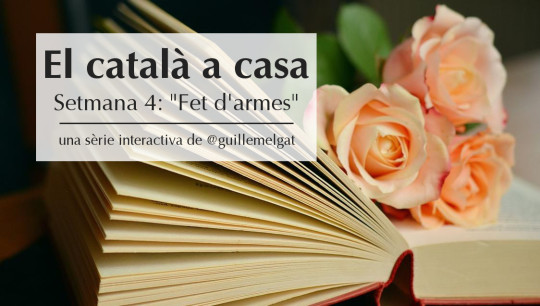
📚Aquí teniu el text d’aquesta setmana (“Fet d’armes” de Pere Calders)
📝 Tasca 7: Llegeix en veu alta el conte que vas escriure ahir.
📍Fés un post amb… una gravació de la lectura.
#el català a casa#catalan#la vida sense queue#catalan:general#catalan:challenge#general:challenge#catalan:reference
16 notes
·
View notes
Photo

📚Aquí teniu el text d’aquesta setmana (un fragment de La pell freda d’Albert Sànchez Piñol)
📝 Tasca 6: Mira aquest clip fins al minut 1:48 per trobar les respostes a les següents preguntes:
Qui viu dins de la cova?
Per què no surten?
On miren la gent que viu dins de la cova? Què hi veuen?
Pensen que són reals les ombres? Per què?
Què descobreix l'home que surt de la cova? Quina és la lliçó de la història?
📍Fés un post amb… les respostes que has trobat i algun dubte si no ho has entès.
#sí he posat merlí ho sé#és que anava molt bé amb el text#(i també m'encanta com a sèrie però això no hi té res a veure /s)#el català a casa#catalan#challenges#catalan:general#catalan:challenge#general:challenge#catalan:reference
17 notes
·
View notes
Photo

📚Aquí teniu el text d’aquesta setmana (“Fet d’armes” de Pere Calders)
📝 Tasca 4: Llegeix la secció del diàleg i tria dues veus molt distinctes pels dos personatges per distingir-los. Intenta triar veus que transmeten algun aspecte de la personalitat de cada personatge.
📍Fés un post amb… una gravació de la teva interpretació!
#el català a casa#catalan#la vida sense queue#catalan:general#catalan:challenge#general:challenge#catalan:reference
13 notes
·
View notes
Photo
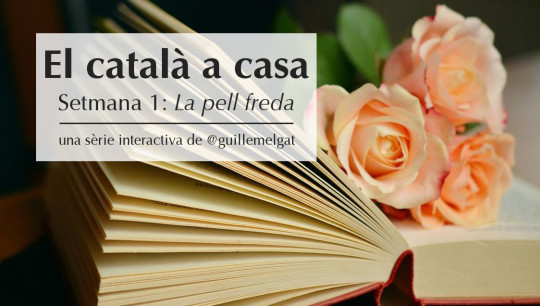
Benvinguts i benvigudes a una nova sèrie de posts pels que aprenen català! Cada setmana, triaré un text i us donaré unes quantes tasques. Podeu fer les que vulgueu, i si us hi atreviu, posar-les aquí perquè jo o algú altre pot corregir-les! El text d’aquesta setmana és un fragment del llibre La pell freda d’Albert Sànchez Piñol:
No totes les pràtiques es resolien per escrit, la majoria eren pràctiques solitàries. N'hi havia una, per exemple, que consistia a fer-me seure al mig d'un prat durant sis minuts i trenta segons exactes. Durant aquest període el meu únic deure era anotar totes les formes de vida que existissin en un petit rectangle, curosament delimitat per vetes i fils. Al principi només hi veia herba però a poc a poc va aparèixer una gamma increïble d'insectes trepadors, voladors i subterranis. Tot vivia, el vent també, i tot manifestava una unitat poc descriptible amb paraules. Les del meu tutor d'aquell dia: Han estat sis minuts i trenta segons, imagini el segon trenta-un per escrit. Títol de la redacció: «Elements contingents del rectangle observat». Mai no suspenia, si no me'n sortia només m'obligava a repetir l'exercici. Això sí, fins a l'infinit, si calia. Aquella redacció em va costar tres mesos. Vaig repetir-la, i repetir-la, fins que un bon dia em vaig limitar a escriure: «L'únic element contingent del rectangle és el rectangle.»
Després, les males herbes del rectangle. Havia de netejar-lo curosament. Va manar-me que destriés les males herbes de les plantes beneficioses. Com que jo no en coneixia cap, estava obligat a consultar-lo abans d'arrencar-les. Aquesta no és una mala herba, deia d'unes, es poden bullir les fulles i fer-ne infusions. Aquesta tampoc, deia d'altres, són espàrrecs silvestres i per tant comestibles, encara més, exquisits. Aquesta tampoc, com s'entén que pugui ser una mala herba si al maig treu unes flors bellíssimes?
Per fi, només quedava una planta. No tenia cap utilitat, no amagava cap secret. Unes fulles fosques, punxegudes i tòxiques, un tronc dur i lleig. Ell va sospirar: d'acord, planta pèssima, però si l'arrenquem, quin sentit tindrien les altres? Cap, vaig dir jo. I a quina conclusió arriba, doncs? Que les males herbes no existeixen. Consideri aprovat l'exercici.
📝 Tasca 1: Llegeix el text. Fés una llista de paraules que no coneixes, i buscar-ne els significats.
📍Fes un post amb... la llista de paraules i significats, i sobretot amb paraules que encara no entens després de buscar les seves definicions.
#no hi havia gaire gent apuntant-s'hi però ho faré igual#aquesst llibre la veritat és que no m'ha agradat gaire però aquesta part sí que està força bé#i s'enten bastant fàcilment#la següent tasca vindrà demà :0#el català a casa#catalan#challenges#catalan:general#catalan:challenge#general:challenge#catalan:reference#catalan:reading#general:reading
16 notes
·
View notes